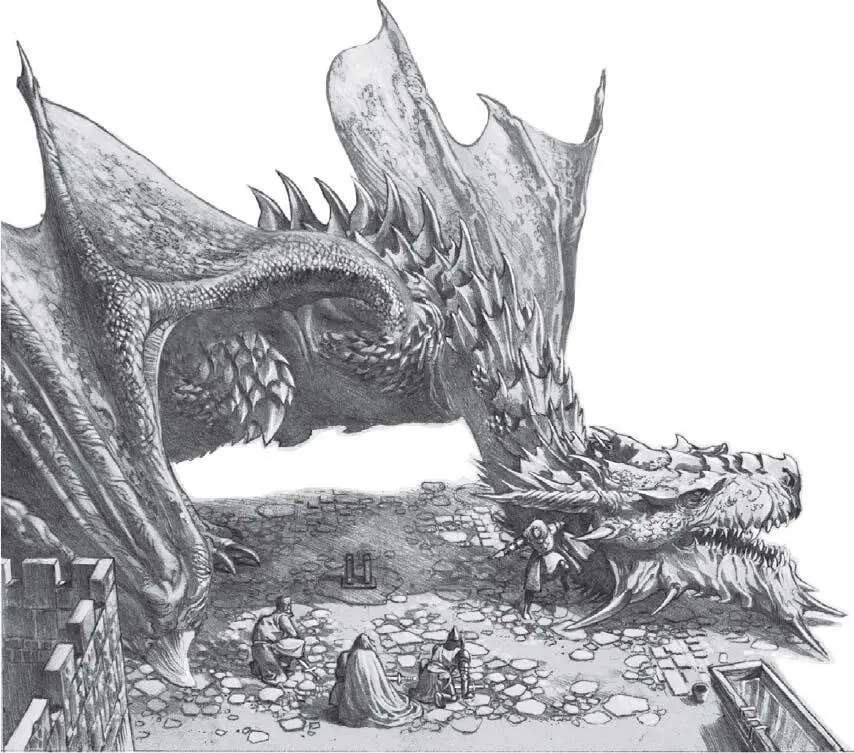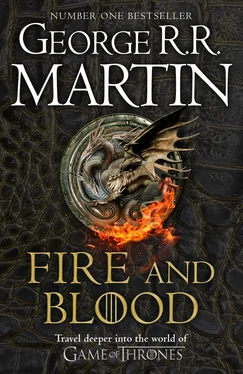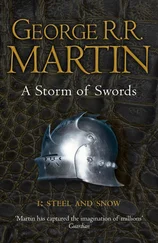Jaehaerys I Targaryen ascended the Iron Throne in 48 AC at the age of fourteen and would rule the Seven Kingdoms for the next fifty-five years, until his death of natural causes in 103 AC. In the later years of his reign, and during the reign of his successor, he was called the Old King, for obvious reasons, but Jaehaerys was a young and vigorous man for far longer than he was an aged and feeble one, and more thoughtful scholars speak of him reverently as “the Conciliator.” Archmaester Umbert, writing a century later, famously declared that Aegon the Dragon and his sisters conquered the Seven Kingdoms (six of them, at least), but it was Jaehaerys the Conciliator who truly made them one.
His was no easy task, for his immediate predecessors had undone much of what the Conqueror had built, Aenys through weakness and indecision, Maegor with his bloodlust and cruelty. The realm that Jaehaerys inherited was impoverished, war-torn, lawless, and riven with division and mistrust, whilst the new king himself was a green boy with no experience of rule.
Even his claim to the Iron Throne was not wholly beyond question. Although Jaehaerys was the only surviving son of King Aenys I, his older brother Aegon had claimed the kingship before him. Aegon the Uncrowned had died at the Battle Beneath the Gods Eye whilst trying to unseat his uncle Maegor, but not before taking to wife his sister Rhaena and siring two daughters, the twins Aerea and Rhaella. If Maegor the Cruel were accounted only a usurper with no right to rule, as certain maesters argued, then Prince Aegon had been the true king, and the succession by rights should pass to his elder daughter, Aerea, not his younger brother.
The sex of the twins weighed against them, however, as did their age; the girls were but six at Maegor’s death. Furthermore, accounts left us by contemporaries suggest that Princess Aerea was a timid child when young, much given to tears and bed-wetting, whilst Rhaella, the bolder and more robust of the pair, was a novice serving at the Starry Sept and promised to the Faith. Neither seemed to have the makings of a queen; their own mother, Queen Rhaena, conceded as much when she agreed that the crown should go to her brother Jaehaerys rather than her daughters.
Some suggested that Rhaena herself might have the strongest claim to the crown, as the firstborn child of King Aenys and Queen Alyssa. There were even some who whispered that it was Queen Rhaena who had somehow contrived to free the realm from Maegor the Cruel, though by what means she might have arranged his death after fleeing King’s Landing on her dragon, Dreamfyre, has never been successfully established. Her sex told against her, however. “This is not Dorne,” Lord Rogar Baratheon said when the notion was put to him, “and Rhaena is not Nymeria.” Moreover, the twice-widowed queen had come to loathe King’s Landing and the court, and wished only to return to Fair Isle, where she had found a measure of peace before her uncle had made her one of his Black Brides.
Prince Jaehaerys was still a year and a half shy of manhood when he first ascended the Iron Throne. Thus it was determined that his mother, the Dowager Queen Alyssa, would act as regent for him, whilst Lord Rogar served as his Hand and the Protector of the Realm. Let it not be thought, however, that Jaehaerys was merely a figurehead. Right from the first, the boy king insisted upon having a voice in all decisions made in his name.
Even as the mortal remains of Maegor I Targaryen were consigned to a funeral pyre, his young successor faced his first crucial decision: how to deal with his uncle’s remaining supporters. By the time Maegor was found dead upon the Iron Throne, most of the great houses of the realm and many lesser lords had abandoned him … but most is not all . Many of those whose lands and castles were near King’s Landing and the crownlands had stood with Maegor until the very hour of his death, amongst them the Lords Rosby and Towers, the last men to see the king alive. Others who had rallied to his banners included the Lords Stokeworth, Massey, Harte, Bywater, Darklyn, Rollingford, Mallery, Bar Emmon, Byrch, Staunton, and Buckwell.
In the chaos that had followed the discovery of Maegor’s body, Lord Rosby drank a cup of hemlock to join his king in death. Buckwell and Rollingford took ship for Pentos, whilst most of the others fled to their own castles and strongholds. Only Darklyn and Staunton had the courage to remain with Lord Towers to yield up the Red Keep when Prince Jaehaerys and his sisters, Rhaena and Alysanne, descended upon the castle on their dragons. The court chronicles tell us that as the young prince slid from the back of Vermithor, these “three leal lords” bent their knees before him to lay their swords at his feet, hailing him as king.
“You come late to the feast,” Prince Jaehaerys reportedly told them, though in a mild tone, “and these same blades helped slay my brother Aegon beneath the Gods Eye.” At his command, the three were immediately put in chains, though some of the prince’s party called for them to be executed on the spot. In the black cells they were soon joined by the King’s Justice, the Lord Confessor, the Chief Gaoler, the Commander of the City Watch, and the four knights of the Kingsguard who had remained beside King Maegor.
A fortnight later, Lord Rogar Baratheon and Queen Alyssa arrived at King’s Landing with their host, and hundreds more were seized and imprisoned. Be they knights, squires, stewards, septons, or serving men, the charge against them was the same; they were accused of having aided and abetted Maegor Targaryen in usurping the Iron Throne and in all the crimes, cruelties, and misrule that followed. Not even women were exempt; those ladies of noble birth who had attended the Black Brides were arrested as well, together with a score of lowborn trulls named as Maegor’s whores.

With the dungeons of the Red Keep full to bursting, the question arose as to what should be done with the prisoners. If Maegor were to be counted as usurper, then his entire reign was unlawful and those who had supported him were guilty of treason and must needs be put to death. Such was the course urged by Queen Alyssa. The Dowager Queen had lost two sons to Maegor’s cruelty and was of no mind to grant the men who had carried out his edicts even the dignity of a trial. “When my boy Viserys was tortured and slain, these men stood by silently and spoke no word of protest,” she said. “Why should we listen to them now?”
Against her fury stood Lord Rogar Baratheon, Hand of the King and Protector of the Realm. Whilst his lordship agreed that Maegor’s men were surely deserving of punishment, he pointed out that should their captives be executed, the usurper’s remaining loyalists would be disinclined to bend the knee. Lord Rogar would have no choice but to march on their castles one by one and winkle each man out of his stronghold with steel and fire. “It can be done, but at what cost?” he asked. “It would be a bloody business, one that might harden hearts against us.” Let Maegor’s men stand trial and confess their treason, the Protector urged. Those found guilty of the worst crimes could be put to death; for the remainder, let them tender hostages to ensure their future loyalty, and surrender some of their lands and castles.
The wisdom of Lord Rogar’s approach was plain to most of the young king’s other supporters, yet his views might not have prevailed had not Jaehaerys himself taken a hand. Though only ten-and-four, the boy king proved from the first that he would not be content to sit by meekly whilst others ruled in his name. With his maester, his sister Alysanne, and a handful of young knights by his side, Jaehaerys climbed the Iron Throne and summoned his lords to attend him. “There will be no trials, no torture, and no executions,” he announced to them. “The realm must see that I am not my uncle. I shall not begin my reign by bathing in blood. Some came to my banners early, some late. Let the rest come now.”
Читать дальше













